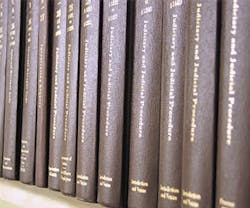BOMA Files
You may have heard about the malfunction of voting devices during the International Code Council’s (ICC) Public Comment Hearings in Long Beach, CA. After several attempts to correct the issue, ICC had to forego the electronic devices and use hand votes because the devices had failed to record the vote on more than 189 public comments.
Under the previous code development process, this snafu would not typically have presented a problem. Results from hearings were used to determine the final outcome on proposed changes. However, under the new process, results of the hearings are used to determine the Online Governmental Consensus Vote ballot, on which all registered governmental members are allowed to vote remotely through cdpACCESS, a new online platform. ICC decided to postpone the online voting, which had been scheduled to take place in October, until it could confirm that the outcome was accurate.
Using the cdpACCESS capability, ICC recreated the hearing online in mid-January for the attendees. The online voters were able to view the original proposed changes, see the public comments submitted on the code change, and view the recorded testimony from the two hearings. Similar to the hearings, cdpACCESS acted as a moderator by limiting the voter to only those motions allowable under the hearing process. Not surprisingly, the outcome of many of the public comments during the first phase of voting did not vary significantly from the votes recorded during the Long Beach hearings, and few public comments actions were reversed during the voting’s second phase.
Had the ICC directors and its membership not had the vision to implement a process in which governmental members can participate online, there would not have been a way to remedy the electronic voting malfunction without reconvening the members and holding another public comment hearing. Despite the difficulties on its maiden voyage, cdpACCESS showed its value to the process and the organization.
BOMA International’s code team, which has represented the commercial real estate industry through the code development process, awaits the results of the Online Governmental Consensus Vote. Based on the preliminary results from both the hearing and the subsequent online voting, BOMA is confident that several of our positions on proposed code changes (see box) will be upheld, benefiting the entire industry.
For more information on the ICC code development process, visit the ICC website at www.iccsafe.org.
Steve Orlowski is BOMA International’s Director of Codes and Standards. He can be reached at [email protected]. For more information about building codes and other commercial real estate topics, visit www.boma.org.
